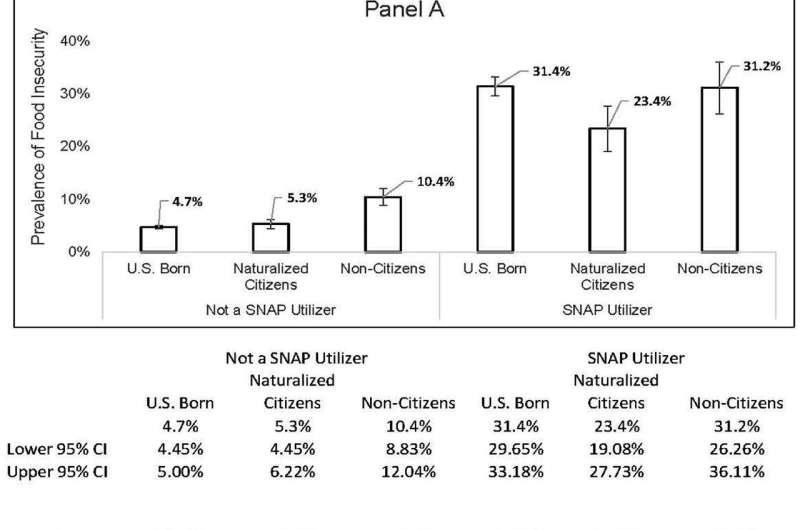This article has been reviewed according to Science X's editorial process and policies. Editors have highlighted the following attributes while ensuring the content's credibility:
fact-checked
trusted source
proofread
Study: US immigrants particularly vulnerable to food insecurity

In the United States, immigrants are particularly vulnerable to food insecurity, defined as the lack of access to adequate food for an active, healthy life. A new study led by researchers at University of Utah Health reveals that millions of immigrant households have limited or uncertain access to adequate food.
Individuals who are not U.S. citizens are more susceptible to food insecurity regardless of their income, education, and utilization of Supplemental Nutrition Assistance Program (SNAP) benefits. The findings suggest that the simple fact of being a non-citizen puts individuals at risk.
The study, reported in AJPM Focus, was led by Nasser Sharareh, Ph.D., a research assistant professor in the Department of Population Health Sciences at U of U Health. Sharareh, who left his home in Iran to study in the U.S. in 2014, knows firsthand about food insecurity in immigrant communities and the health problems it can cause.
Based on his team's findings, Sharareh says, "Increasing awareness about safety net programs, specifically federal nutrition assistance programs, and removing the stigma could have a significant impact on reducing food insecurity disparities between non-citizen and U.S.-born individuals."
Overlooked and unassisted
More than 10% of U.S. households experienced food insecurity in 2021, but it hasn't been clear how much worse the problem is for the immigrant population. Considering the fact that more than 45 million immigrants live in the U.S., addressing food insecurity among immigrants is critical to improve public health and reduce food insecurity-associated costs, Sharareh says.
Sharareh and his colleagues, including researchers at U of U Health, the University of California, San Francisco, and the University of Arkansas, turned to survey data from the U.S. Census Bureau to better understand how food insecurity impacts the immigrant population. As part of the National Health Interview Survey, respondents were asked whether they had experienced limits to their household's food access related to a lack of money. The team analyzed data from more than 63,000 adults, including people born in the U.S., naturalized U.S. citizens, and non-citizens, who were surveyed in 2019 and 2020.
The researchers determined that there are disparities in food insecurity between non-citizen and U.S.-born individuals even after adjusting for income, education, employment, and health insurance inequalities. In contrast, immigrants who have become naturalized citizens of the U.S. experience food insecurity at rates similar to U.S.-born citizens.
Specifically, among people with an income above 200% of the federal poverty level, they found that non-citizen and naturalized citizen households were 1.88 and 1.66 times more likely to report food insecurity compared to the U.S.-born households. The difference may partially lie in the ability of U.S. citizens to better take advantage of more extensive social support networks. Structural racism and disadvantaged neighborhoods may also contribute to higher food insecurity rates among immigrants, the authors say.
By contrast, the team found no disparities in food insecurity between immigrants and U.S.-born citizens among households where income is very low, earning less than 200% of the federal poverty level. In these situations, people often have to make choices between food, housing, health care, and other expenses, and these experiences may be similar for immigrants and the U.S.-born, Sharareh says.
"Naturalized citizens, despite their U.S. citizenship, are seen less than equal than U.S.-born individuals as mistrust and discrimination against them have been demonstrated in various anti-immigrant policies," the authors note. They add that "future research should evaluate the impact of these factors on food insecurity disparities between immigrants and the U.S.-born."
A way forward
Federal assistance through the Supplemental Nutrition Assistance Program (SNAP) can help low-income households meet their food needs. Indeed, the researchers found that when people participated in the program, food insecurity disparities between immigrants and U.S.-born citizens were eliminated. But many non-citizens do not access this support. Many are ineligible for the program, and even those who are eligible often do not enroll.
The study authors say a variety of factors may make eligible immigrants reluctant to enroll in SNAP, including fear of deportation or social stigma, concern about how participating in the program may impact the naturalization process, and language barriers. "SNAP is a very important safety net for people in poverty who are having trouble feeding their families, and a lot of non-citizens may be excluded from that," says Fernando Wilson, Ph.D., study author and professor of population health sciences at U of U Health.
The authors estimated that among non-citizens in the U.S. who did not utilize SNAP and were food-insecure, 1.3 million could be eligible for SNAP and/or food pantry enrollment and utilization. "Now that we're documenting a large difference in food insecurity between non-citizens and U.S.-born, what are we going to do about it?" Wilson says. "If SNAP is a straightforward way of addressing and knocking down that difference, that's something we need to discuss and potentially rectify."
More information: Nasser Sharareh et al, Food Insecurity Disparities Among Immigrants in the United States, AJPM Focus (2023). DOI: 10.1016/j.focus.2023.100113





















